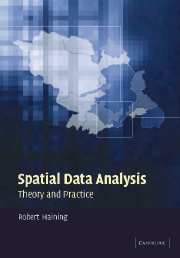Book contents
- Frontmatter
- Contents
- Preface
- Acknowledgements
- Introduction
- Part A The context for spatial data analysis
- Part B Spatial data: obtaining data and quality issues
- Part C The exploratory analysis of spatial data
- 5 Exploratory spatial data analysis: conceptual models
- 6 Exploratory spatial data analysis: visualization methods
- 7 Exploratory spatial data analysis: numerical methods
- Part D Hypothesis testing and spatial autocorrelation
- Part E Modelling spatial data
- Appendix I Software
- Appendix II Cambridgeshire lung cancer data
- Appendix III Sheffield burglary data
- Appendix IV Children excluded from school: Sheffield
- References
- Index
5 - Exploratory spatial data analysis: conceptual models
Published online by Cambridge University Press: 06 July 2010
- Frontmatter
- Contents
- Preface
- Acknowledgements
- Introduction
- Part A The context for spatial data analysis
- Part B Spatial data: obtaining data and quality issues
- Part C The exploratory analysis of spatial data
- 5 Exploratory spatial data analysis: conceptual models
- 6 Exploratory spatial data analysis: visualization methods
- 7 Exploratory spatial data analysis: numerical methods
- Part D Hypothesis testing and spatial autocorrelation
- Part E Modelling spatial data
- Appendix I Software
- Appendix II Cambridgeshire lung cancer data
- Appendix III Sheffield burglary data
- Appendix IV Children excluded from school: Sheffield
- References
- Index
Summary
Chapter 6 and 7 consider methods used to explore spatial data. This chapter covers some preliminary ground by defining in section 5.1 exploratory spatial data analysis (ESDA) with reference to exploratory data analysis (EDA). It then considers in section 5.2 some conceptual models for describing spatial variation. Conceptual models are identified because they help to characterize spatial variation in a non-formal way and so help to clarify what the analyst might look out for (in terms of spatial variation) in undertaking ESDA. Formal, statistical, models are not needed for exploratory spatial data analysis, although some of the exploratory forms of analysis discussed in chapter 7 that involve hypothesis testing need to specify a model for spatial randomness. These are discussed as they are needed. The discussion of statistical models for more general forms of spatial variation is left until chapter 9.
EDA and ESDA
Good (1983) defines exploratory data analysis (EDA) to be a collection of techniques for summarizing data properties (descriptive statistics) but also for detecting patterns in data, identifying unusual or interesting features in data, detecting data errors, distinguishing accidental from important features in a data set, formulating hypotheses from data. EDA techniques may also be used to examine model results, provide evidence on whether model assumptions are met and whether there are influential data effects in model fits.
- Type
- Chapter
- Information
- Spatial Data AnalysisTheory and Practice, pp. 181 - 187Publisher: Cambridge University PressPrint publication year: 2003



